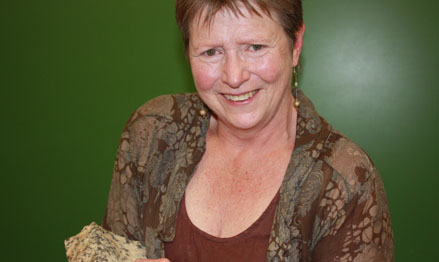Latest News Archive
Please select Category, Year, and then Month to display items
![]()
The Vice-Chancellor and Principal of the University of the Free State, Prof Francis Petersen, is pleased to invite you to the launch of the Artists in Residency Programme. This event marks the exciting start of a new initiative at the university.
We are honored to have Mike van Graan, a distinguished independent artist and playwright, as our inaugural artist and playwright in residence. Van Graan boasts an impressive career, having authored 36 plays and contributing significantly to the cultural landscape. His expertise extends beyond playwriting, encompassing cultural policy, artist network development (both locally and across Africa), and advocacy work. Notably, he held leadership positions within esteemed organisations such as Arterial Network, the African Arts Institute, and the STAND Foundation. Van Graan's dedication to cultural activism and artistic creation is widely recognised.
Please join us for this momentous occasion:
Date: Thursday 27 June 2024
Time: 15:00-17:00 (followed by a cocktail reception)
Venue: Scaena Theatre, UFS Bloemfontein Campus
For further information, contact Alicia Pienaar at pienaaran1@ufs.ac.za.
Programme highlights include:
- Staged Reading: An excerpt from Return of the Ancestors, a play that pays homage to the satirical South African political play, Woza Albert, explores themes of democracy and sacrifice through the return of figures such as Steve Biko and Neil Aggett.
- Closed Premiere: The Good White, set against the backdrop of the 2015/16 student protests in South Africa, delves into contemporary issues such as race, social justice, and the complexities of human relationships.
Prof Tredoux turns theories regarding the formation of metals on its head
2013-09-17
|
 |
|
Prof Marian Tredoux
17 September 2013 |
The latest research conducted by Prof Marian Tredoux of the Department of Geology, in collaboration with her research assistant Bianca Kennedy and their colleagues in Germany, placed established theories regarding how minerals of the platinum-group of elements are formed, under close scrutiny.
The article on this research of which Prof Tredoux is a co-author – ‘Noble metal nanoclusters and nanoparticles precede mineral formation in magmatic sulphide melts’ – was published in Nature Communications on 6 September 2013. It is an online journal for research of the highest quality in the fields of biological, physical and chemical sciences.
This study found that atoms of platinum and arsenic create nanoclusters, long before the mineral sperrylite can crystallise. Thus, the platinum does not occur as a primary sulphur compound. The research was conducted at the Steinmann Institute of the University of Bonn, Germany, as well as here in Bloemfontein.
Monetary support from Inkaba yeAfrica – a German-South African multidisciplinary and intercultural Earth Science collaborative of the National Research Foundation (NRF) – made this research possible. Studies are now also being conducted on other metals in the precious metal group, specifically palladium, rhodium and ruthenium.
The discovery of the nanoclusters and the combination with arsenic can have far-reaching consequences for the platinum mine industry, if it can be utilised to recover a greater amount of platinum ore and therefore less wastage ending up in mine dumps. This will signify optimal mining of a scarce and valuable metal, one of South Africa’s most important export products.
For Prof Tredoux, the research results also prove thoughts she already had some twenty years ago around the forming of platinum minerals. “Researchers laughed in my face, but the evidence had to wait for the development of technology to prove it.” Young researchers were very excited at recent congresses about the findings, since the new models can bring new insights.
“Chemistry researchers have been talking about platinum element clusters in watery environments for quite a while, but it was thought that these would not appear in magmas (molten rock) due to the high temperatures (>1 000 degrees celsius).”
Prof Tredoux has already delivered lectures at congresses in Scotland, Hungary, Sweden and Italy on this research.
Read the article at: http://www.nature.com/ncomms/2013/130906/ncomms3405/full/ncomms3405.html